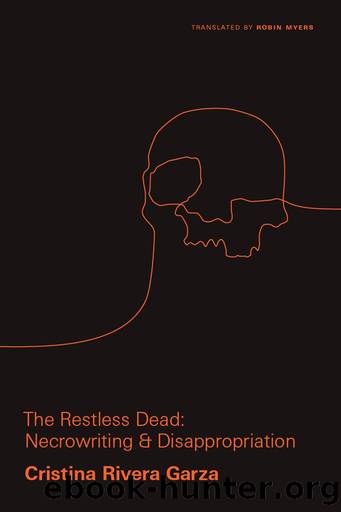The Restless Dead by Cristina Rivera Garza

Author:Cristina Rivera Garza
Language: eng
Format: epub
Publisher: Vanderbilt University Press
Published: 2020-08-15T00:00:00+00:00
Undead Authors
The Autobiographical and David Markson (1927â2010)
DYING FOR
Given the dates when Roland Barthes and Michel Foucault introduced their ideas on the death of the author, and considering their immediately colossal influence on the reading public, we could conclude that the author (at least within a certain Western tradition) died more or less at the start of the second half of the twentieth century. Barthes published The Death of the Author in 1968, while Foucault delivered his lecture âWhat Is an Author?â to the Société Française de Philosophie in February 1969.1 Countering the romantic notions of writing that hinged on an authorial figure who privileged the expressive faculties of a lyrical I, Barthes asserted, in close adherence to Stéphane Mallarmé, that âonly language acts . . . not âme.ââ This statement launched a devastating critique (lethal, actually) against the empire of the author. And in doing so, it launched the hegemony of the reader. Because Barthes believed that the text âis made up of multiple writings, drawn from many cultures and entering into relations of dialogue, parody, contestation,â he argued that the authorâs sole power consisted of mixing together these writings, which preceded her. In this way, she effectively translated what was always and inescapably already there. Untroubled by the question of textual originality, which was and remains an inquiry into the reliable expression of authorial interiority, Barthes insisted that the text is âa tissue of quotations drawn from the innumerable centres of culture,â with a meaning revealed or forgedâreconstituted, certainlyâby the act of reading. Thus: âThe reader is the space on which all the quotations that make up a writing are inscribed without any of them being lost; a textâs unity lies not in its origin but in its destination.â
Some months later, before an audience that included Jacques Lacan, among others, Foucault asked âWhat is an author?â to interrogate the position from which the authorial role is carried out. Responding to a question raised in this case by Samuel Beckett (âWhat does it matter who is speaking?â), Foucault developed a critical analysis of the conditionsâincluding the authorâs name and its meaning, the appropriative relationship between author and language, and the attributive relationship between author and textâthat permits the figure of the subject to emerge as the âoriginatorâ of discourses, not as a complex and variable function of them. Ultimately, it didnât matter who was speaking. (It was to be expected that Foucault would reach this conclusion.) What did matter was, and is, to ask with respect to surrounding discourses: ââHow, under what conditions, and in what forms can something like the subject appear in the order of discourse?â âWhat place can it occupy in each type of discourse, what functions can it assume, and by obeying what rules?ââ
David Marksonâan experimental US-American author, an attentive reader of Thomas Pynchon and William Gaddis, and the author of (among other books) Wittgensteinâs Mistress, was concerned with the death of the author.2 Literally. In his latest novelsâespecially in the series comprising Readerâs Block, This
Download
This site does not store any files on its server. We only index and link to content provided by other sites. Please contact the content providers to delete copyright contents if any and email us, we'll remove relevant links or contents immediately.
Cecilia; Or, Memoirs of an Heiress — Volume 1 by Fanny Burney(32558)
The Great Music City by Andrea Baker(32019)
Cecilia; Or, Memoirs of an Heiress — Volume 2 by Fanny Burney(31956)
Cecilia; Or, Memoirs of an Heiress — Volume 3 by Fanny Burney(31942)
We're Going to Need More Wine by Gabrielle Union(19046)
All the Missing Girls by Megan Miranda(16029)
Pimp by Iceberg Slim(14508)
For the Love of Europe by Rick Steves(14121)
Bombshells: Glamour Girls of a Lifetime by Sullivan Steve(14076)
Talking to Strangers by Malcolm Gladwell(13370)
Norse Mythology by Gaiman Neil(13366)
Fifty Shades Freed by E L James(13241)
Mindhunter: Inside the FBI's Elite Serial Crime Unit by John E. Douglas & Mark Olshaker(9343)
Crazy Rich Asians by Kevin Kwan(9292)
The Lost Art of Listening by Michael P. Nichols(7506)
Enlightenment Now: The Case for Reason, Science, Humanism, and Progress by Steven Pinker(7314)
The Four Agreements by Don Miguel Ruiz(6765)
Bad Blood by John Carreyrou(6622)
Weapons of Math Destruction by Cathy O'Neil(6281)
